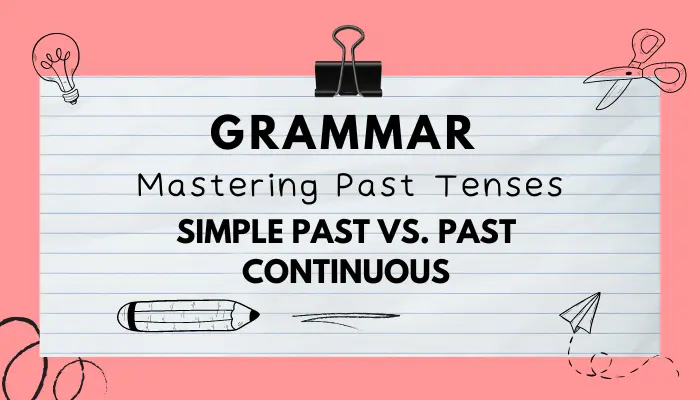Great site to keep my english skills updated for work and travel. I am really enjoying the lessons!
Maria C
 Argentina
Argentina


Understanding past tenses is crucial for effective communication in English. Two common past tenses are Simple Past and Past Continuous. In this article, we will delve into the differences between these tenses, their uses, and provide examples to help you master them.
Simple Past Tense:
The Simple Past tense is used to describe actions that happened at a specific point in the past and are now completed. We form the Simple Past tense for regular verbs by adding "-ed" to the base form of the verb. For irregular verbs, the past tense forms vary and need to be memorized.
Example:
Past Continuous Tense:
The Past Continuous tense, also known as the Past Progressive tense, is used to describe actions that were ongoing or in progress at a particular moment in the past. This tense is formed by using the past tense of the verb "to be" (was/were) followed by the present participle (verb + -ing).
Example:
Differences and Usage:
Simple Past is used for completed actions in the past, while Past Continuous is used for actions that were ongoing or interrupted in the past.
Simple Past emphasizes the completion of an action, whereas Past Continuous emphasizes the duration or continuation of an action.
Example:
Simple Past: He finished his homework before dinner.
Past Continuous: He was doing his homework when the phone rang.
Simple Past is often used for actions that occurred in a sequence or as the main events in a narrative, while Past Continuous is used to provide background information or describe actions that were happening simultaneously.
Example:
Simple Past: She opened the door and walked into the room.
Past Continuous: While she was reading, he was playing the guitar.
In summary, mastering the Simple Past and Past Continuous tenses is essential for expressing past actions accurately in English. By understanding their differences and usage, you can improve your communication skills and convey your ideas more effectively. Practice using these tenses in various contexts to enhance your proficiency and confidence in using English past tenses.
March, 2024
Posted by Darat Ajyal Sharurah
Controlla il tuo punteggio - Prova il nostro quiz inglese gratuito + Ottieni un bonus gratuito